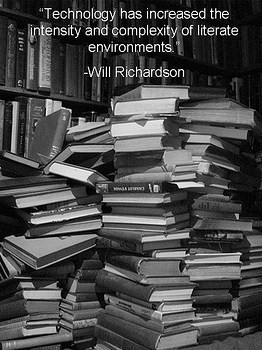One of the challenges of my position in the district where I work has been how to “teach” others about social networking, how do you convey the benefits of virtual personal learning communities / networks, in a 3 hour workshop? How do you cover all the options, explore all the tools available to assist in creating those communities, and also build a comfort level for those interested, but who most likely have never been involved in something like this? As I reflect on my participation in PLP over the past several months and look at the foundations that have been laid for all teams across the cohorts participating this year and examine the structure in place it helps to answer the questions I struggle with. My conclusion is I don’t think you can adequately teach these concepts in an hour or two, to honestly understand the value, having the opportunity to be immersed in the conversations/immersed in the environment is the best way to learn.
What I have been able to see throughout all of the cohorts is the growth of individuals in this environment, there are emerging voices, those who are becoming comfortable are beginning to start discussions, add comments to posts others have made, share their own teaching experiences, as well as personal experience. Here is an example of one who has begun to incorporate some of the tools we have been learning about in PLP in her personal life.
One of the things I remember Will saying at our first meeting was a way to be successful with technology this year. He said that we are all so busy, so technology can’t be added to your life, but must take the place of something you already do. He used the example of how he used to watch the news, but now he uses technology to stay informed. I really thought that was important for me to remember this year. So what I’ve tried to do is use and learn about technology in the things I am already spending much time on. I attended a workshop on gifted students. The keynote speaker was talking about using technology with gifted students, he talked about 21st century skills, web 2.0, wikis, blogs, nings, etc. I understood everything he was talking about and used much of what he talked about with my students. This is the first time ever that I have understood more technology than many other teachers. I am so proud of what I have done the past few months and how much I have learned.
She started using tools she had been introduced to in her cohort, in her personal life, and as a result has gained confidence and understanding in the value of using technology as an integral part of what you do every day rather than add it on to your daily life.
Another portion of a post, from Scott Godshalk, principal, Tohickon Valley Elementary School.
Last year, I tried, unsuccessfully, to facilitate the use of a wiki at our school. I asked teachers to post a reflective document of their work during their Collaboration Sessions. As I reflected on this, I realized I dove in headfirst with the concept of a wiki. This was a new idea for the teachers, and a new way to collaborate. Teachers followed through with this expectation, and posted their Collaboration Session reflections, but there weren’t any additional comments, posts, or discussions about the content of their work. This year, I took a couple steps back, but pushed forward with the idea of a wiki. I send out a weekly bulletin to share my reflections and give teachers my thoughts on school and district initiatives. I spend a great deal of time preparing the weekly bulletin. Recently, I had an epiphany. Why am I working so hard on this? There is a school full of brilliant teachers who have fantastic ideas. They should help me with this! For the last two weeks, I posted a simple question on the wiki site, and had the teachers write a brief response to this question. The results have been phenomenal. Last week, I asked teachers what it means to teach in the year 2008. To be an effective teacher, what are the words that come to mind? Their response was awesome. Our staff is beginning to enter a new phase of collaboration.
Others are beginning to blog, some are sharing classroom experience, resources for teaching and professional development, creating Delicious accounts and sharing web sites with their cohorts. It is remarkable to see the growth of individuals who are supported and encouraged as they expand their knowledge and level of comfort in an area, just a few short months ago; many had never been introduced to before. This is the work of PLP, creating environments for collaboration and learning in ways that are relevant to all of us.




